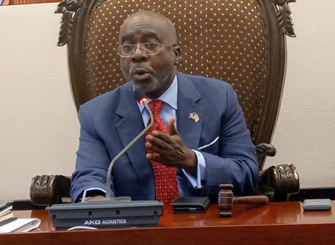A significant political upheaval is currently unfolding in Liberia, with allegations surfacing that approximately 47 lawmakers have received advance bribes totaling $15,000 each, in a grand scheme to oust House Speaker Fonati Koffa. The full bribe promised to these legislators amounted to $25,000, indicating a substantial political maneuvering happening on Capitol Hill. Reportedly, the racket has already amassed over $1.1 million, prompting concerns about the integrity of the governmental process in Liberia. Prominent figures identifying as recipients of the alleged bribe include Representatives Samson Q. Wiah, Alexander Poure, Johnson J.N. Williams, and several others who have seemingly positioned themselves against the Speaker amidst these bribes.
The allegations of bribery, a crime under Liberian law, paint a bleak picture of corruption that undermines democratic processes. Despite these serious claims, the Executive Branch of Government has dismissed accusations of its involvement in attempts to usurp Koffa’s position. The situation escalated on October 17, 2024, when chaos erupted at the House of Representatives as the pro-Koffa lawmakers attempted to resist the actions of their peers who had accepted bribes to initiate a removal process. The tumultuous session witnessed heated arguments that drew lawmakers into near-physical confrontations, demonstrating the tension and division rampant among the legislators.
A critical flashpoint in this power struggle was the action taken by Representative J. Marvin Cole, who locked the doors to the chamber to prevent Deputy Speaker Thomas Fallah from entering. Cole’s insistence on conducting the session without Fallah, along with his allegations questioning Fallah’s integrity, only increased the standoff between factions. Tensions continued to mount as the anti-Koffa group gathered in a joint session, determined to read their resolution detailing the charges against Speaker Koffa. This action led to instances where so-called anti-Koffa proponents physically broke down a door to gain access to the session when conflicts were simmering over their right to be there.
Following this internal turmoil, the anti-Koffa faction rallied outside the chamber to announce their several-count resolution against Koffa, invoking constitutional provisions that allow for the removal of leadership within the House. Specifically, they referenced Article 49 of the Liberian Constitution and Rule 9.1 of the House’s procedural guidelines as grounds for Koffa’s ouster. Allegations against Koffa included accusations of conflicts of interest, wherein Representative Nya Flomo of Nimba County claimed that Koffa’s dual roles as a consultant and lawyer to governmental and private entities hampered legislative functions. Such accusations raise questions about the ethical boundaries of elected officials in Liberia.
In this complicated landscape, the anti-Koffa group declared a vote of no confidence against the Speaker. However, the procedural validity of their actions remains in question. The process for formally removing a Speaker requires that the resolution be properly read during an official session, included on the session’s agenda, and ultimately subjected to a vote. The chaotic readings conducted outside the chamber do not suffice under the established parliamentary process, revealing significant procedural misunderstandings or strategic maneuvers by the anti-Koffa faction. Therefore, while there is a deep-seated push against Koffa, the legitimacy and formal compliance with legislative protocols could undermine their case.
As this politically charged atmosphere unfolds, the implications for Liberia’s political stability and governance are significant. Bribery and internal discord among lawmakers challenge not only the integrity of the legislative body but also create a challenging environment for effective governance. With Speaker Koffa currently out of the country, the dynamics on Capitol Hill may shift dramatically, impacting future legislative actions and the trust citizens place in their elected representatives. The ongoing situation signifies the fragility of political institutions in Liberia and underscores the pressing need for considerable reforms aimed at enhancing transparency and accountability among public officials.
Ultimately, the events on Capitol Hill serve as a critical reminder of the pervasive struggles within various governments to uphold democratic values and ethical standards among elected representatives. As the anti-Koffa movement strives to gather momentum, the overarching response from both the government and the public will determine the future course of action for the House of Representatives. It remains to be seen whether these unfolding events will lead to significant reforms that curb corruption or further erode the public’s trust in their political institutions.














